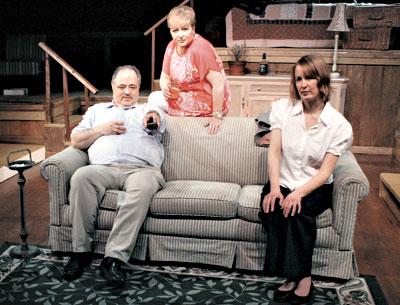A Gentler ‘Osage County’

Those who thought the recent film version of “August: Osage County” was shrill might find the current production at the Southampton Cultural Center under Michael Disher’s direction more to their liking.
The film boasted many pretty people and some titanic acting talent, but John Wells, its director, started his actors, and particularly Meryl Streep, who played Violet Weston as an outsized force of nature, at an Olympian-level 11. Mr. Disher and his Violet, Linda McKnight, show the same drug-addled mania and confusion with similar pathos but at an intensity befitting a mortal. Ms. Streep, of course, has earned the right to have fun being repellent. Ms. McKnight, however, displays a great deal more empathy in her interpretation. That is not to say she doesn’t crackle with bitterness and withering ripostes, but those moments are crescendoes, not a sustained wail.
The overall light-handed approach also highlights Tracy Lett’s text, which is actually funny, something that doesn’t always come across in the film.
Sam Shepard, Ewan McGregor, Chris Cooper, Benedict Cumberbatch, and Dermot Mulroney were the key male roles in the film, which are mainly foils to the female characters, and are easy on the eyes, but Philip Reichert, John Leonard, Stephan Scheck, Joseph Marshall, and Paul Consiglio fulfill their roles ably.
Mr. Reichert had the biggest shoes to fill as Beverly Weston. The patriarch of the family and award-winning poet is only seen onstage in the prologue interviewing a potential nurse and aide to Violet, played by Josephine Wallace. Violet has cancer and an addiction to pills, as well, which complements or clashes with Beverly’s alcoholism, depending on the hour. Beverly is a role that needs to be indelible, as the cast and plot meander around his disappearance in the next scene and the rest of the play.
Mr. Shepard, a playwright who came from an alcoholic family with ties to the American West, played the role effortlessly, as if he were merely breathing. It may have been him that I was imagining as the play moved forward. Mr. Reichert had a similar poetic gentleness, but less ease with the text. It was probably due to it being the first night back from a performance break, and his relative distance from my section of the theater.
The setting is the Weston house in Oklahoma, lacking air-conditioning in late summer. The set takes on various parts of the house, including the attic, an outdoor area, the living room, and dining room. The actors move from the center to extreme sides of the stage and even talk over each other in some scenes. It is a lot to take in and sometimes to decipher when one is seated at the opposite part of the theater from where the action is occurring.
Beverly’s disappearance is quickly established, and by scene one much of the family has gathered at the house. There are various sources of tension and humor running through all of the relationships on display from siblings, husbands, cousins, parents, and children. Yet, the central drama is played out between Violet and her daughter Barbara, the heir apparent to her mother’s tart mouth and bitterness. As played by Bonnie Grice, Barbara is weary in the throes of menopause and deeply hurt by her husband’s infidelity. Julia Roberts in the film role hit every line hard, so that even the humor sounded like a screed. Ms. Grice is wan and quiet in her delivery, the sounds of a woman in the process of disappearing into middle age, which makes the more emotional moments stand out by comparison.
As the play progresses, it seems as if Violet’s emotionally violent personality is taking possession of Barbara. These are deep fault lines that trace back generations to a rough-hewn settler survival instinct that called for a certain ruthlessness in tougher times. It’s a legacy that has driven many of the family members away to different counties, states, or regions. The house and Violet’s harsh and slurred truth-telling seem to bring those latent instincts back to those visiting, and a number of tense and extreme scenes follow from it. The cast takes us through those paces, making the scenes emotionally resonant.
It may have been overkill to offer this production this year, so soon after the movie’s release, but its subtler interpretation of the Pulitizer Prize-winning text is worth seeing while the film still lingers in recent memory. The play will be presented tonight at 7:30, tomorrow and Saturday at 8 p.m. and Sunday at 2:30 p.m. Tickets cost $22, or $12 for students under 21. They are available in advance at southamptonculturalcenter.org.
